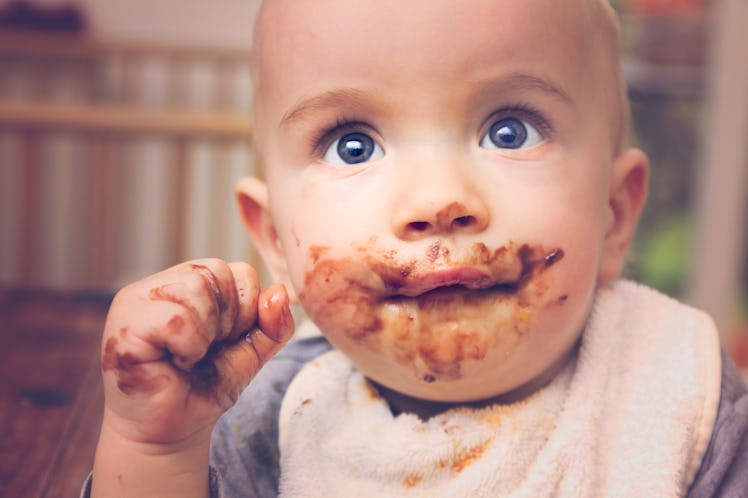What To Do When Your Gross Baby Eats Poop, Boogers, Or Dirt
Children eat so many disgusting things and then kiss their parents with that mouth. Here's how to handle it.

Some kids will eat seemingly anything, as long as it has no nutritional value and is objectively disgusting. From eating dirt to munching on boogers to, yup, eating poop (theirs or the dog’s), there will come a day when your child puts something unspeakable in their mouth, and you’ll have to act fast. So what happens if your baby eats poop? Should you call poison control? Go to the doctor? Can you let your child kiss you with confidence ever again? What is a parent to do when their child ingests something as inedible as it is unfathomable?
First, don’t panic. For most babies, eating poop or other non-food items is part of natural and developmentally appropriate exploration. The lips, tongue, and face have the most nerve receptors in the body, after all. All a kid needs to do to get information about something is shove it in their pie hole, and some scientists even consider tasting a valid form of inquiry.
That being said, not everything is edible. This is your guide to the dangers of babies’ eating various things they shouldn’t — and what you should do when they do.
What Happens If Your Baby Eats Poop?
In small amounts, most poop isn’t harmful. But it could give your kid food poisoning-like symptoms. Mouse poop is dangerous. Dog poop is not. Baby poop is, well, likely to be consumed at some point and probably not a problem beyond being very gross.
What to Do: Watch for diarrhea, vomiting, and fever, which could occur within 30 minutes to four hours of ingestion. If symptoms don’t show up, give your kid some water and keep an eye out. If symptoms do show up and persist, it’s a good idea to call your child’s doc.
What to Do When Your Kid Eats Pet Food?
Small amounts of various pet chow and treats are likely harmless. However, experts have linked some pet food to salmonella outbreaks.
What to Do: Call your pediatrician and let them know. Ask about salmonella symptoms.
What If Your Kid Keeps Eating Boogers?
This is an unsightly habit that many kids fall prey to. It’s deeply unpleasant to watch, and teaching a kid to not pick their nose and eat it is a good idea for social reasons. But there’s no real medical concern here.
What to Do: Politely suggest they stop.
What About When a Kid Ears Dirt, Bugs, and Other Things in the Garden?
Most bugs are nontoxic and are unlikely to cause any serious issues; dirt can actually be really healthy for little kids to consume. It helps them build out their microbiomes — unless it contains fertilizers or feces, in which case it’s likely to trigger food poisoning-like symptoms.
What to Do: Keep an eye on the kid. If they’re eating dirt that you’re confident is clean, let it happen for a bit.
What to Do When a Kid Eats Wild Mushrooms, Berries, and Houseplants?
These things can be incredibly toxic to little systems. Also, there is a tremendous variety, which means you’ll probably need help.
What to Do: Get poison control on the horn and make sure you snap a picture of the offending flora or fungus in question to help the experts identify the risk.
What If You Find Your Kid Eating Your Weed?
Pot decriminalization is occurring in many states, and along with it a surge in tasty-looking (but potent) marijuana gummy bears and other goodies. But little kid systems aren’t ready for your grown-up nonsense.
What to Do: In the most extreme cases of pot “poisoning,” a kid’s breathing could become too shallow to provide enough oxygen. Because the dosage is hard to understand for weed, your best course of action is to call poison control if your kid eats your weed. They are more interested in keeping your kid safe than narcing you out.
What to Do When a Baby Eats Their Own Spit-Up?
It’s not uncommon for a young baby to regurgitate food and then re-consume said food. It’s unpleasant, but mostly a product of the newborn digestive system being slightly wonky.
What to Do: Make sure you know the difference between spit-up and vomiting. If a child is eating their own vomit (or simply vomiting a lot), you should call a pediatrician.
A Note on Pica in Toddlers
For a small number of children, eating non-food related things could be linked with developmental disability or early brain injury. In these children, this condition is called pica. It’s also experienced by some people during pregnancy. You can differentiate pica from normal developmental exploration if you find that your kid persists in eating specific non-food stuff, despite attempts to curb the behavior. Another indication is if the behavior continues past an age when it’s appropriate to explore things with the mouth.
When In Doubt, Call Poison Control
Calling poison control is a no-brainer in circumstances which your kid is gnawing on non-organic inedibles, chewing dryer lint, or quaffing bleach (though you did some baby-proofing to make sure that doesn’t happen, right?). Don’t worry about this being an overreaction. The folks at poison control are used to it and, in most cases, will simply explain that panic isn’t necessary. There are basically two rules to follow:
- Never induce vomiting, and…
- Call poison control if you are ever in doubt.
Much of the stuff your kid can get into from day to day is not capital “P” poisonous. Unpleasant? Yup. A choking hazard? Most assuredly. But in small amounts, nothing to worry about.
This article was originally published on